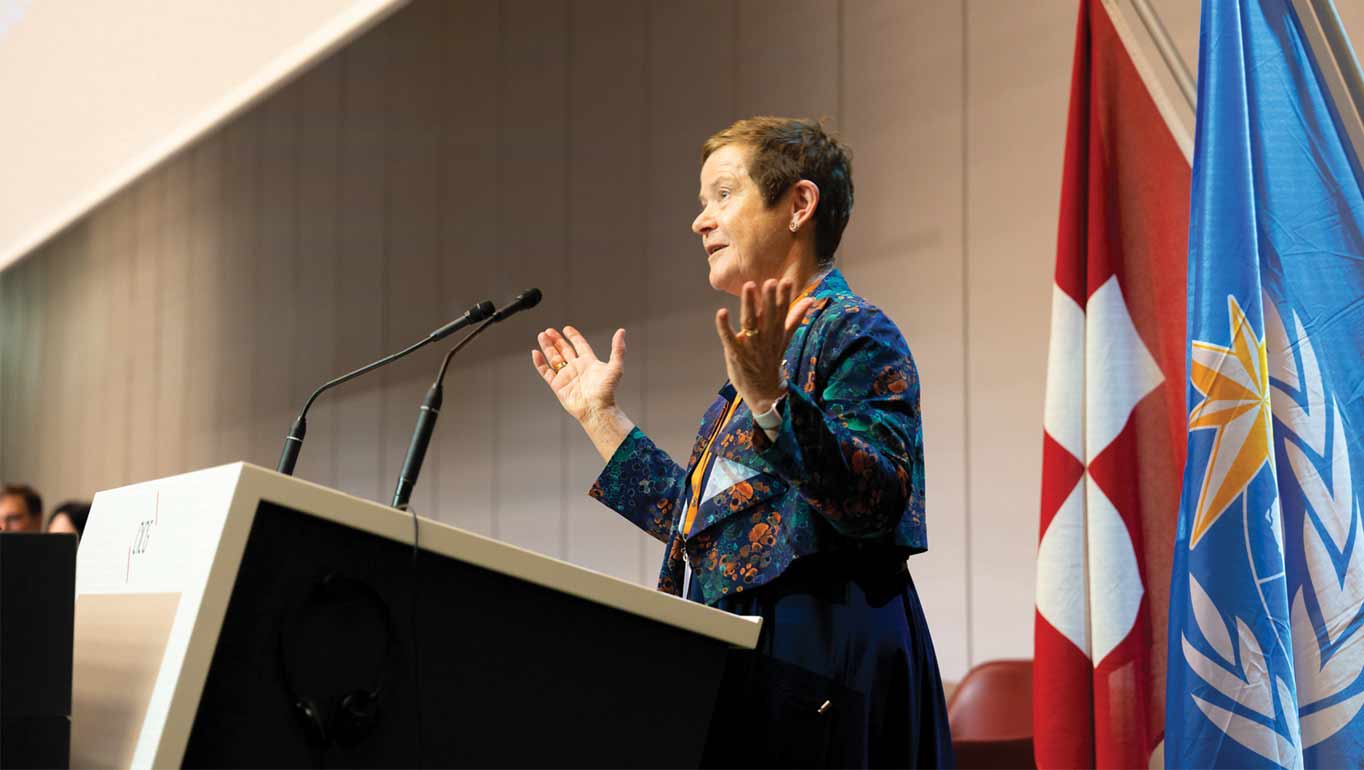The IMO Prize, which originates from the International Meteorological Organization, WMO’s predecessor, is granted in recognition of outstanding contributions in the environmental sciences. The Prize has been awarded annually since 1956. In 2022, Dr Sue Barrell was the fourth woman to be awarded the prize. Dr Barrell’s distinguished career at Australia’s Bureau of Meteorology spanned operational weather forecasting, research, science policy, climate, infrastructure and data.
Tell us about your early influences, how you came to meteorology and the secret to your success.
My parents encouraged all of us (two girls, three boys) to follow whatever interested us, and my natural curiosity about how things worked steered me into math and science. My passion for physics and astronomy took me into a PhD in astronomy, but by the time I finished, I was determined to pursue a career in applied science. That’s when I discovered meteorology, and the rest, as they say, is history!
I have fond memories of my high school math teacher, who opened my eyes to how exciting applied and more advanced math could be. My PhD supervisor reminded me that a PhD is intended to teach you how to do research, not make you the world’s best astronomer. My only female professor had a sign on her wall saying “For a woman to be accepted as equal to a man, she has to prove herself to be twice as good; fortunately, that isn’t difficult!” There are many others who encouraged me to push the boundaries of my interests and capabilities.
Looking back, my career looks more well-planned than it felt at the time. I took opportunities when they arose and I created a few, especially if there was a chance to learn something new. I just couldn’t imagine doing anything different and it helped that I could easily shut out negative influences on me. For the most part, I was surrounded by respectful and positive people, and I was pretty good at ignoring anyone who wasn’t.
How can we attract more girls to science, technology, engineering and mathematics (STEM), retain them in STEM-related careers and give them the recognition they deserve?
We must start early with teachers and parents by nurturing an environment that encourages and harnesses curiosity. Girls are inspired by the difference they can make, and science is a powerful tool for achieving that. An early challenge is creating a sense of equality and equal opportunity – STEM is for both boys and girls, and we need both to understand that. If we can master that, keeping girls in STEM as they transition through school, higher education and into careers will be an easier task.
Both men and women can be allies and help raise the profile, confidence and visibility of women in our workplace: be fair and balanced in recognizing achievement, in acknowledging contributions and ideas, in offering mentoring and training opportunities and in encouraging participation. We should call out bias and prejudice wherever we see it and provide practical support to address inequity.
In the early days of the IMO Prize, there were few women in meteorology and it is understandable that the award went to men, but that is now less excusable. I suspect that women receive fewer accolades due to inadequate recognition of women’s achievements and unconscious bias. As the saying goes: you must be in it to win it. The first step towards an award is being nominated, and we need champions who will raise the visibility of women’s contributions and achievements and create role models who will in turn encourage others.
You have led and mentored many, what advice do you give?
Mentoring works best as a shared contract, where both parties learn something. When I see someone who would benefit from mentoring, I generally encourage them to find a mentor from outside their work area, both for objectivity and to bring different perspectives.
A leader influences the choices or decisions of others and so must appreciate and accept the responsibility and trust that goes with that role. Beyond that, the most valuable leadership traits are honesty, empathy, availability, objectivity and the ability to listen, hear and process multiple perspectives. No pressure!
I am often asked to give advice to aspiring women leaders. I have five tips:
1. Choose your parents well – okay, you can’t choose your parents, but you can be the type of parent, teacher, mentor or leader that you would have liked to have (or did indeed have!), someone who supports, inspires, removes barriers and encourages you to make your own choices.
2. Believe in yourself, or no one else will.
3. There is no such thing as luck – it is all about creating or finding opportunities and making the most of them.
4. It is not just about women – we need men and we need to work together respectfully. That is the meaning of diversity.
5. You can have it all – family, career and the opportunity to make a genuine contribution in your chosen field. It takes work, choices and compromises, but it is easier if you have good allies (and are an ally in return) and surround yourself with positive people.



